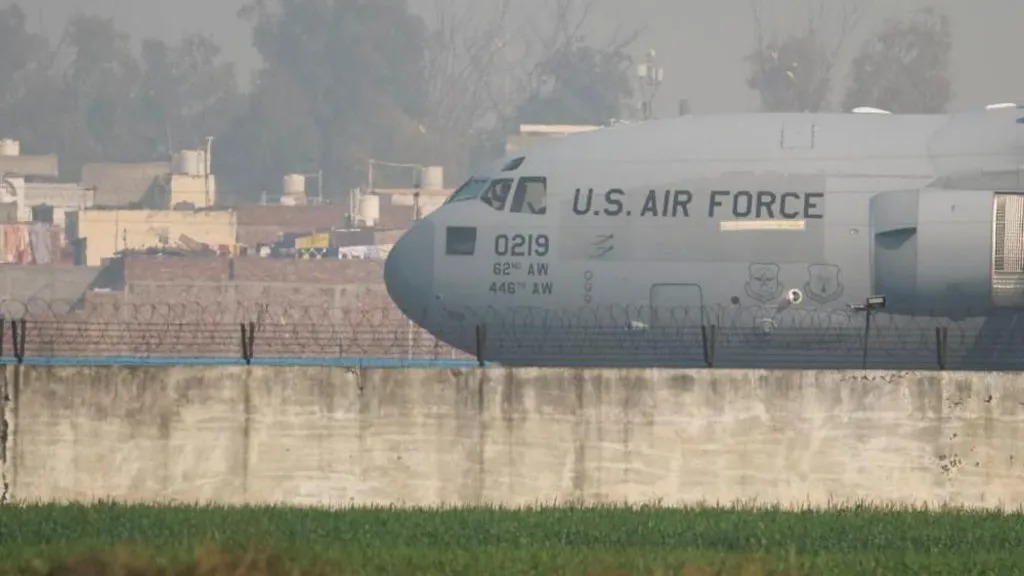
Indian Deportees on Military Flight Spark Outrage
The use of shackles on deportees has stirred a domestic and international outcry. Congress MP Manickam Tagore called the treatment “shocking and shameful,” while MP Shashi Tharoor criticized the use of military planes and handcuffs, calling it an insult to Indian dignity. “The US has a right to deport individuals who entered illegally, but sending them chained in this manner undermines their basic humanity,” Tharoor stated.
The US Department of Homeland Security has defended its policy, stating that the enforcement of immigration laws, including deportations, is critical to national security. ICE officials added that restraints on flights are permissible under US procedures and are used when deemed necessary for security reasons.
This outrage follows other similar incidents globally. In one case, Brazil protested after 88 of its nationals were returned to their homeland in shackles. Colombia even barred US military planes from landing, rejecting what President Gustavo Petro described as the “criminalization” of deportees.
Root Causes of Indian Deportations
The deportees were part of a group of approximately 18,000 Indian nationals identified by US authorities as having entered the country illegally. Many Indians attempt dangerous journeys, often facilitated by fraudulent travel agencies, to seek better opportunities abroad.
Jaspal Singh, one of the deportees, described taking out a loan of 4 million rupees ($46,000) to fund his trip to the US. The journey involved perilous routes through jungles, where he witnessed fellow migrants losing their lives. Such stories reflect the growing desperation among individuals looking to escape poverty or improve their economic conditions.
Fraudulent agents often promise individuals safe passage but leave them vulnerable to extreme risks. Jaishankar acknowledged this issue, stressing that the government is focused on combatting illegal migration practices while ensuring humane treatment of deported individuals.
Responses from Politicians and Rights Groups
Indian lawmakers have expressed anger over the US’s handling of deportees. Leaders called for urgent action, demanding that the government take steps to protect the dignity of Indian citizens abroad. “These incidents tarnish India’s global image,” one opposition leader stated.
International rights organizations have also voiced concerns. They argue that shackling deportees, especially over long-haul flights, constitutes cruel and degrading treatment.
The issue extends beyond India. Several countries, including Brazil and Colombia, have recently condemned the US for the inhumane treatment of deported nationals. Rights advocates stress the importance of adhering to international human rights norms when handling deportations, urging countries to uphold deportees’ dignity.
A Growing Deportation Trend Under Trump
The mass deportation of undocumented foreign nationals has become a cornerstone of President Donald Trump’s immigration policies. The Trump administration has identified around 18,000 Indian citizens living in the US illegally, out of an estimated 725,000 undocumented Indians in the country.
In early statements, Trump claimed that Indian Prime Minister Narendra Modi assured him that India would “do what’s right” in accepting the deported individuals. This collaboration reflects a broader challenge of addressing illegal migration while balancing diplomatic expectations.
The US Border Patrol Chief recently posted a video showing shackled deportees, referring to the deportation flight to India as “the farthest deportation flight yet using military transport.” ICE data highlights increasing deportations of Indians over the years, with 5,477 Indian nationals deported between 2018 and 2023.
Demands for Better Treatment
The recent deportation controversy has amplified calls for humane treatment of deportees. Critics argue that using military flights and restraining individuals for extended periods undermines basic human rights, regardless of their immigration status.
Jaishankar emphasized India’s obligations to receive deported nationals who entered foreign countries illegally but highlighted the need for humane conditions during transit. He reiterated the government’s commitment to working with US authorities to avoid such issues in future operations.
As global deportation policies remain under scrutiny, the case of Indian deportees on a military flight raises important questions about dignity, international cooperation, and the treatment of vulnerable populations.
External Link :
Read more about international migration issues on BBC
Internal Link :
Learn about India’s immigration challenges





